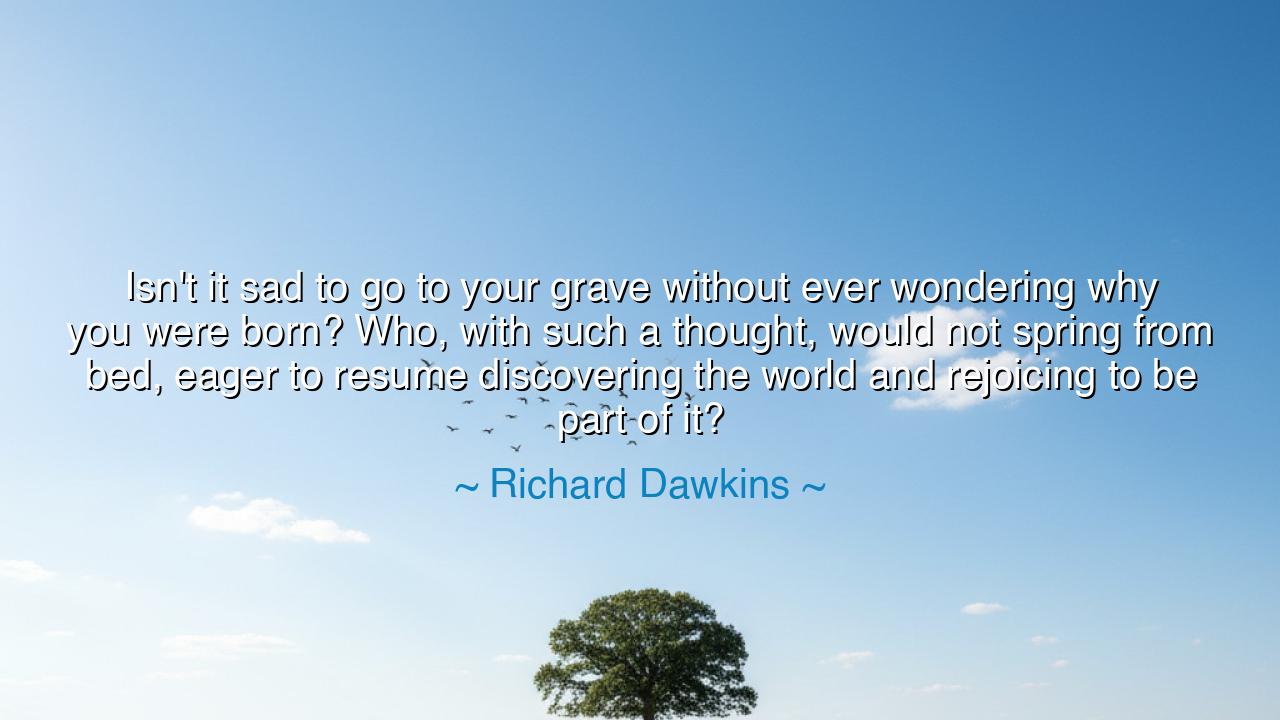
Isn't it sad to go to your grave without ever wondering why you
Isn't it sad to go to your grave without ever wondering why you were born? Who, with such a thought, would not spring from bed, eager to resume discovering the world and rejoicing to be part of it?






The scientist and philosopher Richard Dawkins, in his deep reverence for life and reason, once asked: “Isn’t it sad to go to your grave without ever wondering why you were born? Who, with such a thought, would not spring from bed, eager to resume discovering the world and rejoicing to be part of it?” Though spoken by a man of science, these words sing with the poetry of the soul. They remind us that the essence of living is not merely to exist, but to question, to wonder, to stand in awe before the mystery of being. In them lies both a challenge and a promise—that curiosity is not only the light of knowledge, but also the fire that gives meaning to our brief journey beneath the sun.
The origin of this quote can be traced to Dawkins’ lifelong mission to awaken the human mind from the sleep of indifference. A biologist by trade but a philosopher in spirit, he has spent his life urging people to see the universe not as a random backdrop to existence, but as a vast and wondrous realm worthy of contemplation. In his writings, such as Unweaving the Rainbow and The Selfish Gene, Dawkins explores not only evolution, but the grandeur of life’s complexity. To him, the tragedy of humanity is not mortality, but apathy—to live and die without ever asking, Why am I here? What does it mean to be alive? His words call us to awaken to the miracle that surrounds us, and to treat curiosity as sacred.
To wonder why you were born is not an idle question; it is the act that separates the living from the sleepwalkers of the world. For many drift through life as though it were a chore—working, eating, sleeping—without ever gazing beyond the horizon of necessity. Yet Dawkins reminds us that to ask why is to step into the realm of transcendence, to recognize the divine power of consciousness itself. In every question lies an act of rebellion against ignorance, and in every answer found, a deeper question waiting to be born. This is the eternal rhythm of discovery—the same flame that moved the ancients to chart the stars, to sculpt gods, to write poetry, and to seek truth in the wilderness of the unknown.
History itself bears witness to the power of this sacred curiosity. Consider Galileo Galilei, who dared to look through his telescope and challenge the heavens themselves. When the world condemned him for questioning what was “known,” he refused to bow, whispering still, “E pur si muove”—And yet it moves. His curiosity cost him freedom, but it gave humanity a new sky. Or recall Marie Curie, who risked her life to uncover the secrets of radiation, not for glory, but for wonder—the wonder of understanding the invisible. These souls lived not long, perhaps, but deeply, and in their questioning, they became immortal.
Dawkins’ quote also contains a profound joy—a call to live with gratitude for the gift of consciousness. “Who,” he asks, “would not spring from bed, eager to resume discovering the world?” This is no small exhortation. It is an invitation to greet each day as an opportunity for revelation. The sunrise, the beating heart, the whisper of wind through trees—all are miracles waiting to be rediscovered by eyes unclouded by routine. The wise do not take existence for granted; they see that to be alive, aware, and capable of thought is the rarest privilege in the universe. And from this awareness springs rejoicing—not blind happiness, but the deep, abiding joy of one who sees meaning in the very act of seeking.
The lesson of Dawkins’ reflection is both humbling and empowering: never lose your sense of wonder. Do not let life’s burdens smother the flame of curiosity that burns within you. Ask questions, even if the answers are beyond reach, for the asking itself is a form of worship. Let each dawn remind you that you are part of something vast, that your mind—though small against the stars—is made of the same stardust that lights them. To live without wonder is to die before your time; to question is to remain forever young.
So, my child, as you walk the path of days, remember Richard Dawkins’ wisdom: “Isn’t it sad to go to your grave without ever wondering why you were born?” Let this thought not sadden you, but awaken you. Rise each morning with gratitude, with curiosity, and with courage. Look upon the world not as a place to endure, but as a mystery to explore. For the universe did not give you breath so that you might merely exist—it gave you breath so that you might marvel, seek, and celebrate the astonishing privilege of being alive.






AAdministratorAdministrator
Welcome, honored guests. Please leave a comment, we will respond soon